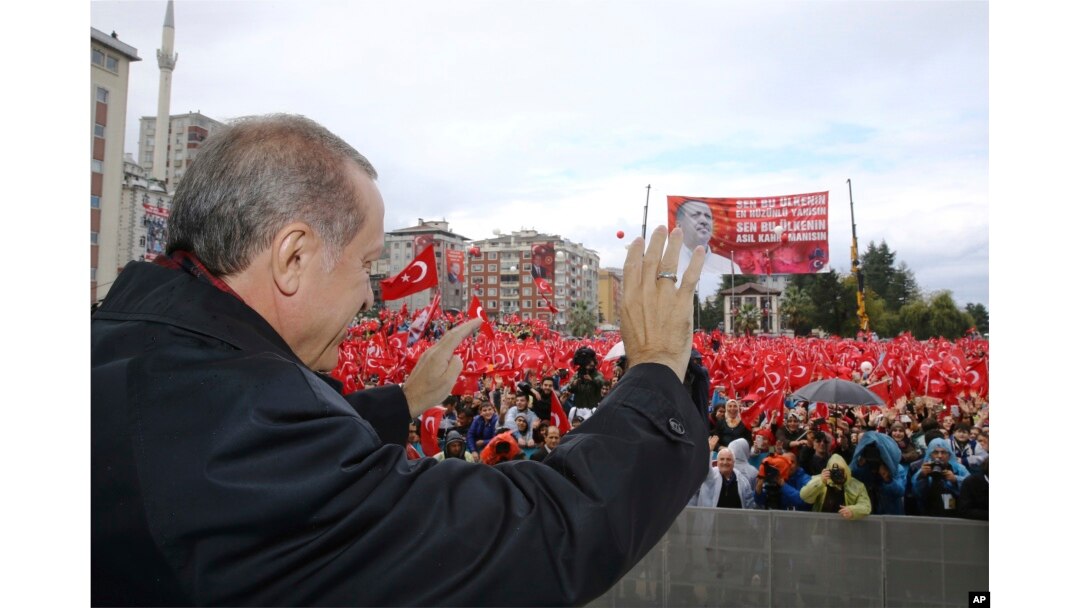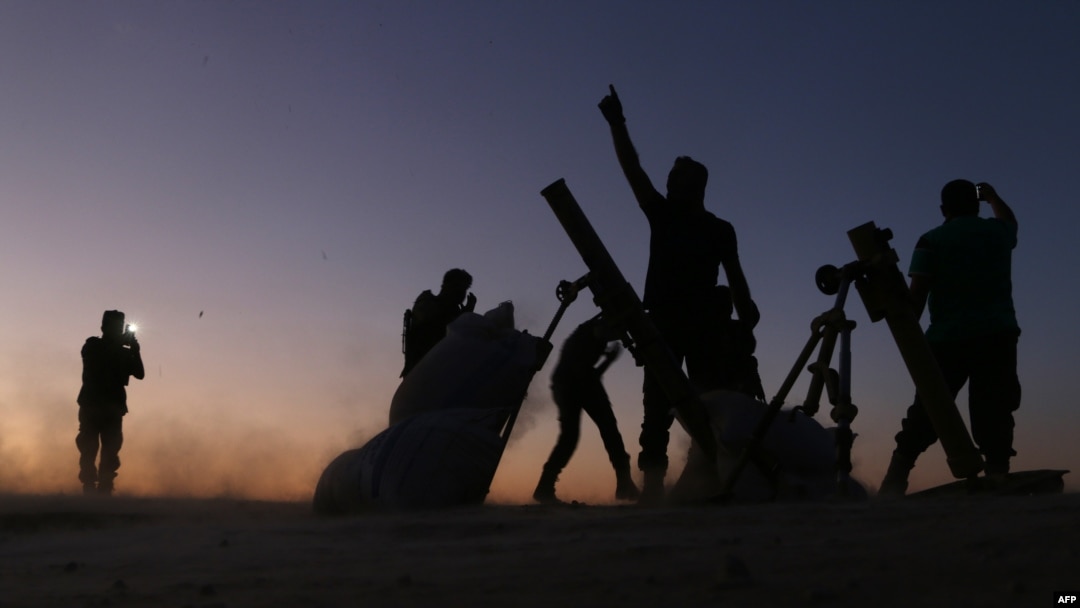Syrian rebels backed by Turkish airstrikes and artillery shelling advanced Saturday to the outskirts of Dabiq, a northern Syrian village that holds little tactical value for its current occupiers, the Islamic State terror group, but is of major religious and symbolic importance for the jihadists, according to Turkish leaders and political activists in the war-savaged country.
In a bid to stop the village from being overrun, IS rushed overnight from its stronghold of Raqqa more than 1,000 mainly non-Syrian fighters to Dabiq, which lies 10 kilometers from the Turkish border, the Syrian Observatory for Human Rights, a monitoring group, reported. But the attacking force seized several strategic areas near the town on Saturday, the observatory and rebel commanders said.
Dabiq holds symbolic importance for IS because of an eighth-century, end-of-times Sunni prophecy predicting it would be the site of an apocalyptic showdown between Islam and Christianity. Islamic State propagandists have encouraged supporters to believe doomsday is imminent and gave the name Dabiq to one of its major online English-language publications.
Every new edition of Dabiq opens with a quote by Abu Musab al-Zarqawi, the mentor of IS leader Abu Bakr al-Baghdadi, claiming, "The spark has been ignited in Iraq, and its flames will grow until they burn the Crusader armies in Dabiq."

Turkish President Recep Tayyip Erdogan salutes the crowd of supporters in his hometown of Rize, on the Black Sea coast of Turkey, Oct. 15, 2016. Erdogan said Turkey was moving into Dabiq, Syria, and would declare a "terror-free safe zone" in the region.
Advancing on Dabiq
Speaking on television, Turkish President Recep Tayyip Erdoğan confirmed rebel fighters with Turkish support were advancing on Dabiq, which is surrounded on three sides. The Syrian Observatory reported Saturday: "Two hours ago, the rebels started their attack to control Dabiq."
The monitors added: "The rebels came from al-Rai," referring to a nearby town recently seized by the Turkish-backed Syrian rebels drawn mainly from the Free Syrian Army, or FSA.
Colonel Abdul-Razzaq Freiji, a commander with the Turkey-aligned forces, told the Associated Press that his fighters were bombarding Dabiq in preparation for an assault.
"Daesh members have gathered lots of fighters for this battle that will be harsh," Freiji said, using the Arab acronym for IS. "We will take it [Dabiq] no matter what the price."
Saturday's bombardment was preceded by attacks on Dabiq's neighboring villages by rebel forces. Rebel commanders reported overrunning Sawran, Ahtimilat and al-Ghilaniyah. Commanders from the FSA's Hamza Division posted online photographs of their fighters advancing using U.S.-supplied Humvees.
IS propagandists
With a final assault looming, IS propagandists appeared to be readying their supporters for a defeat at Dabiq, distancing the ongoing fight for Dabiq from the epic doomsday showdown, known as al-Malhamah al-Kubra, they once forecast. Earlier this week, in an online pamphlet, the jihadist propagandists downplayed the current fight for Dabiq.
Anti-IS fighters and their Turkish backers "have amassed in Aleppo, announcing Dabiq as their major goal," the jihadists said, thinking they can score "a great moral victory against the Islamic State."
But "the great epic of Dabiq will be preceded by great events and apocalyptic omens," they added. "These hit-and-run battles in Dabiq and its outskirts — the lesser Dabiq battle — will end in the greater Dabiq epic." The propagandists don't say when that great showdown is likely to come.
The assault on Dabiq is part of Turkey's wider military intervention aimed at creating "a terror-free safe zone of 5,000 square kilometers" in northern Syria, Erdoğan said.
Turkey launched the mission called Operation Euphrates Shield on August 24, and its goal is to push well back from the border not only IS jihadists but also the Syrian Kurdish militia, the People's Protection Units, or YPG.
Operation Euphrates Shield has dashed the Syrian Kurds' hope of linking all four Kurdish cantons along the frontier, undermining the YPG ambition of carving out an independent state.
Fighters from the Free Syrian Army fire a machine gun mounted on a vehicle deployed during fighting against Islamic State group jihadists on the outskirts of the northern Syrian town of Dabiq, Oct. 15, 2016.
Jarabulus and al-Rai became the first two towns to be captured from IS by the Turkish-backed Syrian rebels. "We are now advancing. Where? To Dabiq," Erdoğan said in his televised comments Saturday, speaking from the Black Sea province of Rize.
Return to Syria
He added that Turkey would like to see some of the 3 million refugees who have fled to Turkey from Syria return home. "Let's create space for them," he said. "They can go to their own lands — we can make them live there safely."
Syrian political activists and nongovernmental organization workers say many refugees would most likely return.
"If the Turkish government and its allies can ensure safety in the zone they carve out, many refugees would go back," activist and NGO worker Eyad Kharaba said.
Rebel commanders say after Dabiq, they will target the town of al-Bab, northeast of Aleppo city. That move could lead to a confrontation with the Kurdish-dominated Syrian Democratic Forces. They have also announced their intention of targeting al-Bab.
A European diplomat told VOA last month that he suspected the Turkey-backed forces would also start moving not only south to the strategic town of al-Bab but also west "to the towns of Marea and Tell Rifaat," which is currently occupied by the YPG and adjoins Afrin, a Kurdish enclave the YPG hoped to link with three cantons east of the Euphrates River.
As Turkey expands its buffer zone with FSA boots on the ground, Ankara already is making clear how it intends to administer its northern Syria "protectorate."
Western NGOs have been tipped off by Turkish counterparts that Turkish and Syrian NGOs favored by Erdoğan will be key in ruling the protectorate. The Turkish authorities are already establishing pro-Turkish town councils in the zone.
Map showing control areas around the Syrain city of Aleppo, as of Oct. 13, 2016
More talks
In other developments Saturday, U.S. Secretary of State John Kerry and his Russian counterpart, Sergei Lavrov, opened another round of talks aimed at easing the crisis in the war-shattered northern Syrian city of Aleppo.
The talks in Lausanne, Switzerland — also attended by diplomats from seven Mideast countries — opened less than two weeks after Washington suspended bilateral talks with Moscow, following the collapse of a shaky cease-fire in the divided city.
Kerry told reporters Saturday that negotiators were "working very hard" to try to reach a cease-fire agreement. However, The Washington Post quoted unnamed U.S. officials as saying no "major announcements" were expected after the talks.
The United States and its coalition partners accuse the Syrian government of President Bashar al-Assad and his Russian allies of conducting a deadly and indiscriminate bombing campaign in rebel-held eastern Aleppo.
Monitors say Russian and Syrian airstrikes and artillery have killed hundreds of civilians in the city and cut off more than 250,000 others from critically needed supplies since September.
For their part, Russian diplomats insist the strikes are targeting extremists. They have repeatedly blamed Washington for failing to separate extremist fighters from the larger rebel fighting force and from the city's civilian population.
VOA's Lou Lorscheider contributed to this report.


